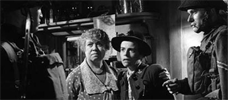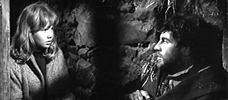Reviews
George Stevens
USA, 1951
Credits
Review by Michael Nordine
Posted on 09 May 2011
Source Paramount Pictures 35mm print
Categories TCM Classic Film Festival 2011
There are many goodbyes in A Place in the Sun, some more permanent than others. What’s immediately noticeable about George Stevens’s film, replete with sorrow though it may be, is that it starts with a simple act of kindness: a man driving a beat-up truck picks up a hitchhiker. The moment is telling in many ways. George Eastman, the hitcher in question and A Place in the Sun’s protagonist, comes from a poor background and spends much of the film trying to advance his position both socially and financially. Before he’s picked up, several cars nicer than the one that eventually stops for him pass him by, including that of Angela Vickers, soon to become the object of George’s desire. It’s with a mixture of relief and disappointment that George steps into the man’s car, and there are few moments throughout the rest of the film when he isn’t dealing with similarly-conflicted emotions.
Chief among these emotions is longing. Not one of the film’s primary characters is satisfied with his or her lot; everyone is after something - or, more often, someone - they don’t already have. This perpetual desire for more applies to the haves (the above-mentioned Angela) as much as it does to the have-nots (Alice Tripp, who completes the film’s love triangle). Between these two extremes is George, a man fully at home among neither but who nonetheless rubs shoulders (and more) with both. Privy to the goings-on of these usually-exclusive social strata as he is, George is often forced to toe a delicate line between one and the other. As such, there are often at least three distinct things occurring in the film at once, with only George aware of all three. (This nod toward the limits of perspective, of certain events’ unknowability, resurfaces later in the courtroom sequence which serves as the film’s climax.) In what amounts to a double life, he hides one part of himself from Alice, another from Angela, and fractures his being in the process. There’s an unknowability to George, an uncertainty as to whether some vital part of him is missing or we just haven’t seen it.
Nearly everybody in A Place in the Sun is victimized in one way or another, but none to quite the same extent as Alice. She’s lied to, manipulated, emotionally abandoned upon her pregnancy, and not saved from drowning—all at the hands of George. Alice asks for and expects far less out of life than anyone else in the film, and her reward for this relative selflessness is an early exit. Indeed, she gets what she wants - George - only to have it taken away. “I’ll tell you what I wish,” she says. “I wish that you loved me again.” It’s not only her treatment and untimely death that make Alice such a tragic figure, but also the fact that she ultimately becomes a mere afterthought both to George and the film as a whole. Drifting in a rowboat above what’s soon to be her watery grave, she encapsulates A Place in the Sun’s solitude within a single statement:
It’s so lonely here. It’s like we’re the only two people left in the whole world. Maybe we are.
For all his trespasses against Alice, however, George doesn’t murder her, and therein lies the film’s final travesty: a judicial system swayed more by visceral grandstanding and character assassination than by actual facts. George is unfaltering in his delivery of the truth that only he knows but is nonetheless convicted by a red-faced prosecutor inclined toward jury-pleasing theatrics. It’s not the truth that matters; it’s whose performance elicits the strongest emotional reaction in the men and women tasked with deciding the fate of the accused. In a way, it’s not the crime he’s on trial for that condemns George but rather the dark path that leads him to it. The power of A Place in the Sun’s plot, and its most noirish element, is in its ability to force the viewer to unquestioningly follow this dream logic. When George isn’t reaching out to somehow improve his life, he’s clinging to the way things are in a desperate attempt to save face. Each of his actions is increasingly outlandish and hopeless, but it’s also a natural consequence of what immediately precedes it.
The tides of A Place in the Sun are as shifting as those of the lake, and role reversals abound. Early in the film George can be seen reading of Angela’s exploits in the newspaper; after his arrest, she reads of his. Not only a sign of the changing times, this also completes the film’s gradual shift from hopefulness to despair. But despite the lynch mob that forms against George at around the same time, the film’s most damning force is love, not hate. It’s the driving force behind nearly every significant happening in the film, which is significant given how awful most of these happenings are.
Notably, and strangely, Stevens uses birdsongs as chirped bellwethers of mood and tone. This oddity recurs frequently but is most prominent when the sound of a bird first heard at the fateful lake is repeated during George’s testimony. We hear it and George seems to as well, but no one else does. The events of that day are irrevocable, and fragments such as this one are to remain with George for the rest of his days. This isn’t the only instance of warped serenity in the film - dark as its waters are, the lake itself is quite beautiful - but it might be the most stylistically daring.
And then there’s that title, to which it seems impossible not to return. It says much of the characters’ desperate longings for one another and the dream lives they’ll never have. George, Alice, and Angela repeatedly grasp at things that are no longer there, as though they’ve simply drifted too far apart. A Place in the Sun is based on Theodore Dreiser’s novel An American Tragedy, and the story is indeed a tragedy of desire and dissatisfaction. Stevens fuses the sensibilities of romance and the machinations of noir so seamlessly that his film stands as an exemplar of each genre. That it tends to only be recognized as the former is disheartening, which is another way of saying it’s in keeping with everything else about the film.
More TCM Classic Film Festival 2011
-

The Outlaw Josey Wales
1976 -

A Place in the Sun
1951 -

Went the Day Well?
1942 -

Becket
1964 -

Whistle Down the Wind
1961 -

The Constant Nymph
1943 -

The Third Man
1949
We don’t do comments anymore, but you may contact us here or find us on Twitter or Facebook.



